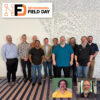Network engineers are the firefighters and knowledge bases of enterprise IT, however the role of a network engineer is rapidly evolving. With the rise of automation, orchestration, and AI, the familiar image of an engineer hunched over a command-line interface (CLI) is giving way, leading many to question the future of their profession. In this episode, Tom Hollingsworth is joined by Ryan Harris, Chris Grundemann, and Nathan Nielsen as they discuss how the perception of their role has shifted, the continuous need for learning and adaptation, and whether the CLI is truly dead. The conversation explores the challenges and opportunities presented by these technological advancements, highlighting how network engineers are embracing new tools like chatbots and GUIs for enhanced visualization. While some aspects of the job, like manual CLI work, may be diminishing, the core principles of understanding network functionality remain core to the role of the network engineer. The panel talks about identity crisis in a field where continuous learning is essential, contrasting it with professions like doctors and lawyers who deal with slower-changing fundamentals. They discuss the value of specialization versus being a generalist, the concept of the “pitchfork engineer,” and ultimately, how redefining their identity as lifelong learners can help network engineers thrive in this ever-changing landscape.
Panelists
| Chris Grundemann | |||
Independent advisor, analyst, and consultant. Specializing in internet routing, network architecture, and automation. |
|||
| Nate Nielsen | |||
Nathan Nielsen (CCIEx2 #47214) is a Principal Solutions Architect at a global solutions integrator, with expertise in Networking, Security, Virtualization, and Multi-Domain strategy and integration. |
|||
| Ryan Harris | |||
Senior engineer that’s going to ask you about your IPv6 plan |
|||
| Tom Hollingsworth |  |
||
Tom Hollingsworth, CCIE #29213, is an event lead for the Tech Field Day event series specializing in networking, wireless, and security topics. |
|||











